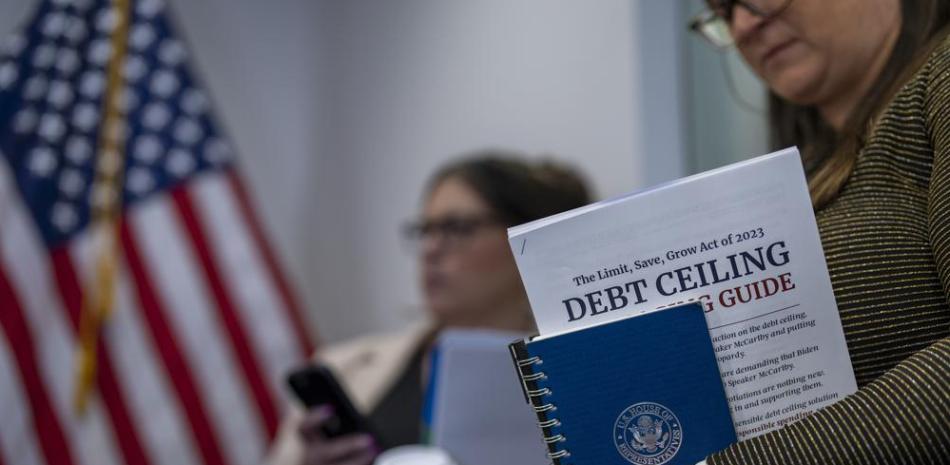With the threat of an unprecedented US default looming, a meeting between President Joe Biden and opposition leader Kevin McCarthy did not resolve the confrontation between the two on Monday, despite the fact that both described the meeting as “productive”.
Treasury Secretary Janet Yellen made clear what was at stake when she insisted hours earlier that it is “very likely” that the US government will run out of money after June 1.
Upon receiving the leader of the House of Representatives at the White House, Biden said he was “optimistic” about closing the meeting with a “breakthrough.”
“We do not have an agreement, but a productive discussion in the areas where we have differences of opinion,” McCarthy said after the meeting.
“The tone of tonight’s meeting has been better than all the times before,” he added, but noted: “We still have philosophical differences.”
The president later used language similar to McCarthy’s in a statement, calling the meeting “productive” while adding that “areas of disagreement” remain.
Both had met twice in a fortnight with other congressmen, but this time they met face to face.
The meeting was supposed to leave behind the bitter debates this weekend between officials from both parties, in the absence of Biden who was in Japan at the G7 Summit.
In the midst of those discussions, Biden and McCarthy spoke on Sunday, as the president was flying back from the G7 Summit in Japan.
Following Monday’s meeting in the Oval Office and McCarthy’s description of the talks as productive, his team hardened its tone.
Republican congressman and negotiator Patrick McHenry told reporters: “What I sense from the White House is a lack of urgency.”
concrete effects
To eliminate the risk of a default, Congress must approve raising the ceiling on public debt. The Senate is controlled by the Democrats and the Republicans control the House of Representatives.
Republicans are demanding a sharp cut in public spending as a condition of increasing borrowing but Biden, who is campaigning for re-election in 2024 on promises of social justice, opposes it.
Before the meeting McCarthy said he was quite optimistic. He assured on CNN that “what is negotiated will be seen by a majority of Republicans as the correct solution to put us on the right track.”
Biden declared on Monday that he is also in favor of reducing the deficit and that he considers it necessary to “examine the fiscal spaces and make sure that the rich pay their fair share” of taxes.
The so-called “debt ceiling” of more than $31 trillion – a world record – was reached several months ago, but the federal government has so far managed the situation through accounting manoeuvres.
If it does not honor its obligations, the United States will no longer be able to pay the holders of Treasury bonds, the refuge of world finances. Nor could the government pay benefits or veterans’ pensions, for example.
The consequences for the world economy would be catastrophic, warn economists.
“America has never defaulted on its debts. And that will never be the case,” Biden said.
A decision made at the last minute could also have consequences. In 2011, there was only the threat of default and this caused, for the first time, the United States to lose its precious triple A credit rating; the best rating agency.
trump’s shadow
Meanwhile, the shadow of Donald Trump rests on the negotiations. The former Republican president, who maintains strong influence, urged his party on May 10 to refuse to raise the debt limit, which would trigger default, if Democrats do not agree to cut spending.
On Sunday, White House spokeswoman Marine Jan-Pierre deplored the “extreme partisan demands” put forward by conservatives.
McCarthy, for his part, accused the “left wing of the Democratic Party” of being “at his command.”
If disagreements persist, Biden has one recourse left: invoke the 14th Amendment to the US Constitution, which stipulates that “the validity of the public debt of the United States, authorized by law, (…) must not be questioned”.
In other words, the expenses already voted must be able to be paid.
Despite considering this possibility, Biden was skeptical, while Yellen also alluded to “legal uncertainty” and a “tight deadline.”
McHenry, the GOP negotiator, described a “very difficult situation” to reach a deal that clears up a divided Congress and becomes law in the next 10 days.
Like almost all major economies, the United States lives on credit. However, in the United States it is the prerogative of Congress to vote to increase the public debt ceiling that the world’s leading economy is authorized to accumulate.
And what was initially a formality has now become a political battle.
